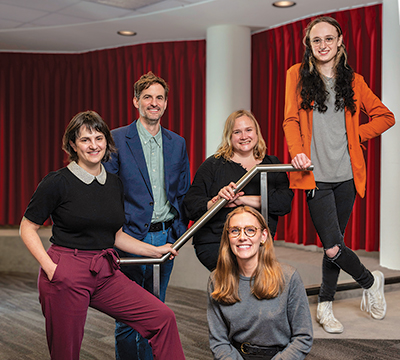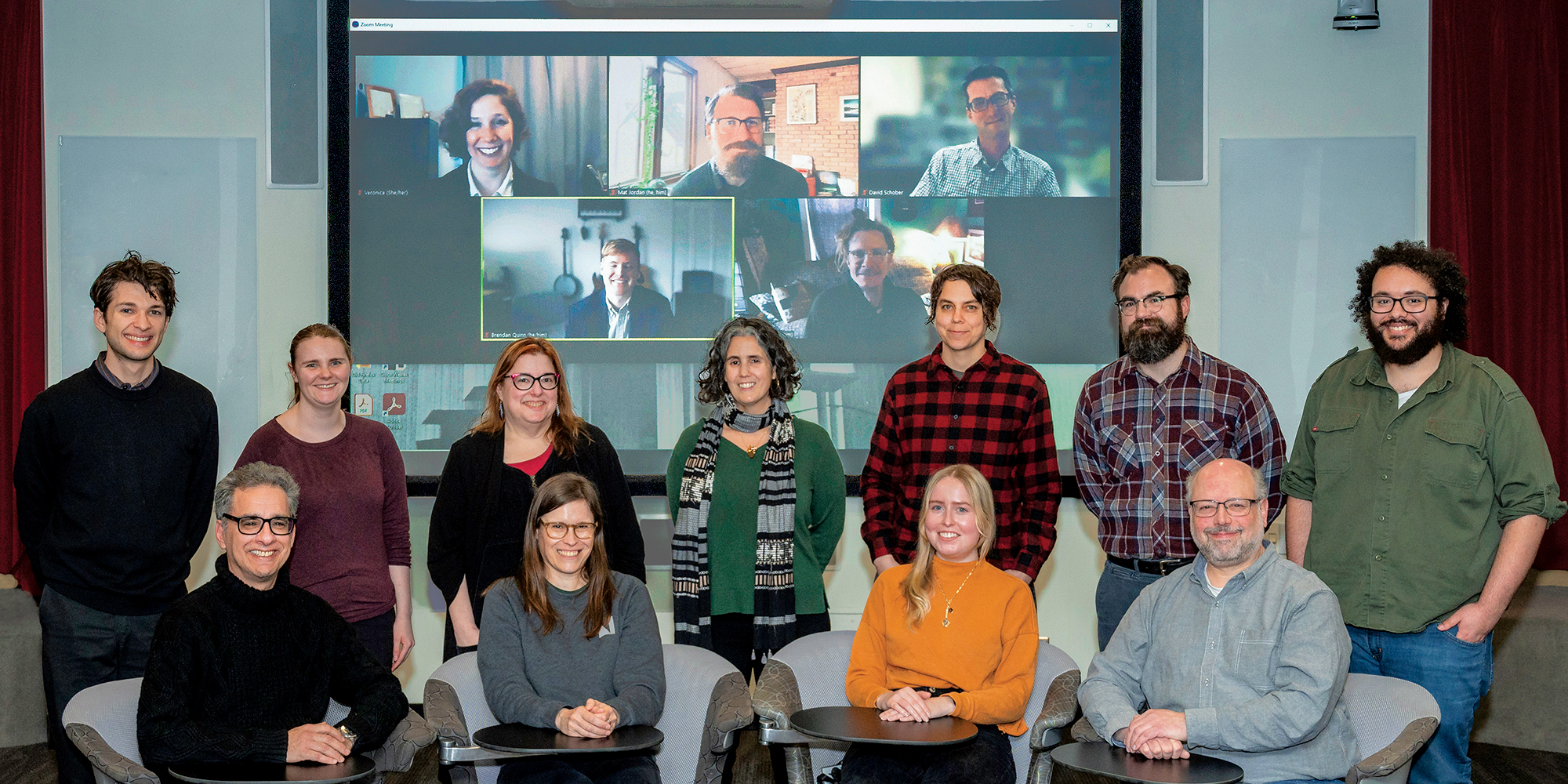Reinventing digital services
New teams support research on big datasets and digitized material
Photography by Jim Prisching
A librarian’s work today is in many ways the same as it ever was: scholars need access to knowledge, and librarians are there to preserve that knowledge, catalog it, and make it easy to use precisely when it is needed. But what’s different at this stage of the 21st century is the number of iterations that knowledge is undergoing in the digital age—more information, bigger datasets, and more sophisticated methods for analysis.
This means librarianship must change too, says dean of libraries Xuemao Wang—not to simply adapt to the moment, but to lead the race for getting ahead of it.
“An important part of our mission is to bolster the University’s research, and that is increasingly a digital realm,” he says. This is why “transforming digital research” is one of the three key pillars of Wang’s new library vision and why he recently announced an organizational realignment to double down on how the Libraries support this work. The realignment brings library specialists together in two teams that will build on each other’s expertise and support the research community in a coordinated capacity, rather than merely in one-off fashion or short-term projects.
The first team is entirely new. Digital Scholarship and Research Data Management combines the powers of librarians specializing in digital forms of academic work. The second team, Digital Products and Data Curation, is a reimagining of the work group that has managed the Libraries’ audiovisual repository. Both groups now report to the new associate University librarian for academic innovation, James Lee. (See Lee's letter on digital services in this issue.)
“Our goal is to foster deep collaboration with scholars,” Wang says, “in part by using emerging computational technologies like artificial intelligence and machine learning, which have become essential in this work. I believe we are positioning ourselves to be leaders in the library field while helping the University accomplish its greater mission to advance innovation in research.”
Meet the teams that are leading the Libraries in a digital direction.
We want to be there at the beginning of an idea so we can work in a collaborative partnership for its entire life.”
Digital Scholarship and Research Data Management
Five related support areas come together under this new work group headed by Kelsey Rydland, the former leader of geospatial and data services.
- A digital humanities librarian brings an interdisciplinary approach to using digital tools in research projects about culture and society. This role may entail helping researchers build the most effective website for displaying complex findings or teaching a student the relevant tools for visualizing a set of hard-to-explain data.
- A digital publishing librarian works with scholars to use free and open methods of sharing their research widely. This can range from helping an academic department archive conference proceedings to helping faculty establish their own open-access publications—such as the Bulletin of Applied Transgender Studies, which debuted in 2022 under editor TJ Billard, a School of Communication assistant professor.
- A data analysis librarian works with researchers to apply software tools to both quantitative and qualitative data. This could mean applying advanced statistical methods to a dataset or conducting an analysis of a large number of texts, perhaps to identify trends or patterns across thousands of newspaper articles.
- A geographic information systems specialist helps scholars turn geospatial data—information linked to a geographic coordinate—into interactive maps. GIS projects often allow a researcher to efficiently analyze data that is affiliated with locations or to facilitate communicating concepts visually. Imagine, for example, a city map linked to population demographics and how it might be used to study growth and to plan for service needs.
- A data science librarian specializes in machine learning and artificial intelligence techniques that help researchers organize and analyze massive amounts of data so that a previously unwieldy amount of data can become manageable and useful for study.

It's useful to have all this expertise within one group, because when we have conversations with faculty or graduate students, we know who on the team has the exact skills to match a project,” says Rydland.
In the past, each of these roles could involve helping with one part of a research project. But as a unified front, the digital scholarship team is poised to provide more service than a one-off consultation. “We’re transitioning to be more of a partner,” he says. “We want to be there at the beginning of an idea so we can work in a collaborative partnership for its entire life.”
That’s particularly important in social sciences, humanities, and other fields that haven’t historically had a lot of access to or support for digital tools. “Those researchers have ambitious ideas, and now this team can make it easier to realize those ideas,” he says.
Digital Products and Data Curation
The former Repository and Digital Curation work group will continue digitizing the Libraries’ physical materials and managing the online space where these images and audiovisuals can be found. But Wang’s new concept for this team builds on the pattern of innovation that has been in progress for some time here. Digital Products and Data Curation librarians have an impressive track record of creating innovative software tools that improve how people find digitized works and use them in research.
“We operate like an entrepreneurial software development startup,” says Carolyn Caizzi, who heads the group. “This name change is a recognition that we are designing software products not just for researchers here at Northwestern Libraries but for cultural heritage organizations everywhere.”
It’s the ethos of open-source development that allows the Digital Products team to contribute to—and frequently lead—the development of software that other libraries can employ. For example, the team collaborated with Indiana University to develop a grant-funded open-source audiovisual platform that allows institutions to host their own digital collections. It also recently introduced Serverless IIIF, an innovation in viewing repository images that makes fewer demands on the computing infrastructure, thus reducing costs and delivering content faster.
This name change is a recognition that we are designing software products not just for researchers here at Northwestern Libraries but for cultural heritage organizations everywhere.”
The group’s recent innovations include experiments with artificial intelligence. Last year, Caizzi’s team began prototyping an AI search tool that could simplify how researchers swim through a sea of data as large as a repository. This promising new tool searches the repository using a text query, such as “Do you have any examples of French humor in the collection?” The team continues to develop the tool further and is publishing how they did it so that other developers across the library tech community can contribute to the conversation.
“We are always looking to build software that has a direct impact in the Libraries,” says Caizzi, “but we want the tools to have a global reach beyond Northwestern. Our specialty isn’t just innovating in these areas but making our work available for others to implement.”
Her group operates like a true software firm, employing the Agile development model. Team members coalesce around an idea; then, to build a proof of concept in a short amount of time, they conduct weeks-long “sprints” to focus exclusively on that idea, evaluating and reevaluating progress every step of the way. Once they generate results, they share them with the open-source community so that others in the cultural heritage technology world can weigh in, test products under their own conditions, and improve on the work done at Northwestern.
“The work we do here has a far wider impact than just on campus, ”Caizzi says. “Open software developers build on each other, informing and improving what they each have worked on, so what we do here can influence the work done in libraries and museums across the country.”
More innovation is on the way; a new product will generate a near-instant exhibition of images from repositories around the world.
